“Story Ave” Writer/Director Aristotle Torres Brings the Bronx to the Big Screen
Writer/director Aristotle Torres‘ feature debut, Story Ave, is centered on Kadir (Asante Blackk), a bright teenager from the South Bronx with a gift for visual arts filled with promise. But when Kadir’s younger brother dies, the loss amplifies the pressure cooker of modern teenage life—the demands of school, the expectations of family—and specifically the life of a kid living life in the Bronx, where an entire world of opportunity and danger is just a few steps out of your front door. Soon enough, Kadir seeks out a new kind of family in a graffiti gang, and to prove himself, he tries to rob an MTA employee named Luis Torres (Luis Guzmán). Luis knows stick-up kids, he tells Kadir—and he’s not one of them. The encounter ends up changing both of their lives.
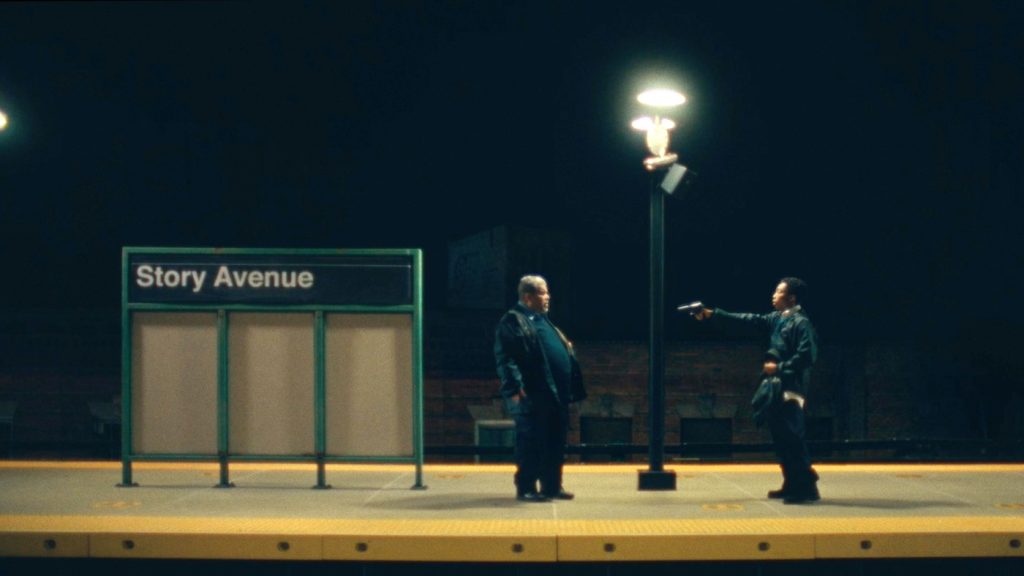
“Guzmán and Asante were the heart that kept us going,” Torres says. Luis Guzmán is, of course, one of the most beloved character actors in the business, but for Story Ave, he was always Torres’ first and only choice. “The only role that I knew for a fact I needed, that I wrote for this actor, I couldn’t make the movie without Luis Guzman. He was my first point of attack,” he says. Asante had a big role in Ava DuVernay’s When They See Us, and Torres rounded out the rest of the cast with nimble performers like Melvin Gregg, Cassandra Freeman, Coral Peña, Curtiss Cook Jr. Then there’s Alex R. Hibbert, who starred as a young boy in Barry Jenkins’ seminal Moonlight.
“Alex coming from Moonlight and Asante from When They See Us, those two young men are so poised,” Torres says. “If I were that poised at twenty years old, my god, my life would be so different. [Laughs]. They’re so mature and wise beyond their years and very grounded. They understand their purpose from a very young age.”
We spoke with Torres about crafting his moving feature debut.
Let’s start with what drew you to this story?
I’m really proud that my film explores the subculture of graffiti in an emotional way. I think we’ve seen it portrayed as a backdrop or tool for character development, but it’s rarely ever explored in a way where you understand the nuances of the world. At the same time, it’s more so than a movie about graffiti; it’s a movie about the family you choose versus the one you’re born into. And any opportunity to contribute to the conversation of people of color, graffiti artists specifically, and how they’re viewed as vandals rather than artists. It was also an opportunity to showcase the Bronx in a way that contradicts the negative stereotypes about what that place is. These are the things that kept me going and writing the script in an impossible amount of time and kept going when I was rejected by every financier and production company. I knew what my mission was, and the mission was much more important than just making a movie—it was representing this world that made me who I am.
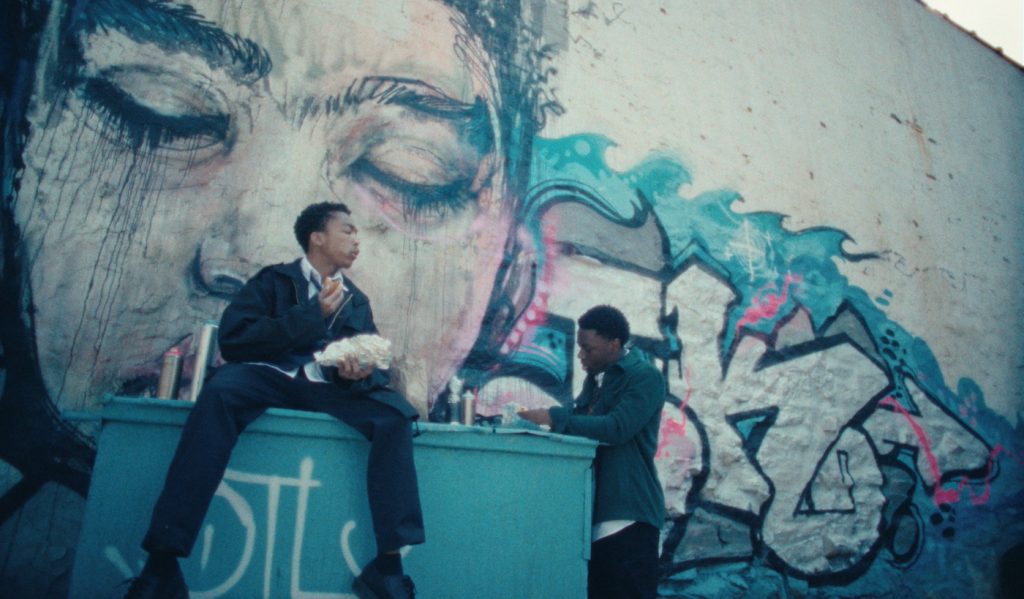
Walk me through the scriptwriting process for you.
So we had a little bit of a tumultuous but serendipitous entryway into writing this script. I initially wrote a short in 2017, and it didn’t get into any of the A-tier festivals, but it got into a lot of regionals. My objective at the time was to make it a play. I was talking to Lin Manuel-Miranda’s people about doing a derivative of the short, which is just the robbery and the diner scene. I thought it could live in a really unique way on stage. Then Sundance reached out to me and was like, ‘We saw this short; we think it’s great.’ They were talking to me about the Sundance Lab—the Holy Grail, right?—and they were like, ‘Our application process has closed, but if you can get us a draft in two weeks, we’ll consider it.’ At the time I was directing Starbucks’ first campaign ever, it was a two million dollar campaign and the biggest job of my career, a six-figure paycheck. I just remember saying to my ex-girlfriend, ‘I can’t write the script in two weeks. I’m not prepared for my moment.’ I had to email them back and say, look, I’m so honored and humbled by this offer, but I can’t do it.
Understandable reaction. Two weeks is extremely fast.
To their credit, they had more belief in me and the story than I did at the time. They were like, ‘No, we’ll fast-track you to the final round, which will give you five weeks to write it. We really believe in it. But your first draft will be up against everyone’s fourth draft, so it’s a long shot. You probably won’t get in, but if you want to take the risk, here’s the code.’ And I quit the Starbucks job and started. That’s how I had to write the script in five weeks.
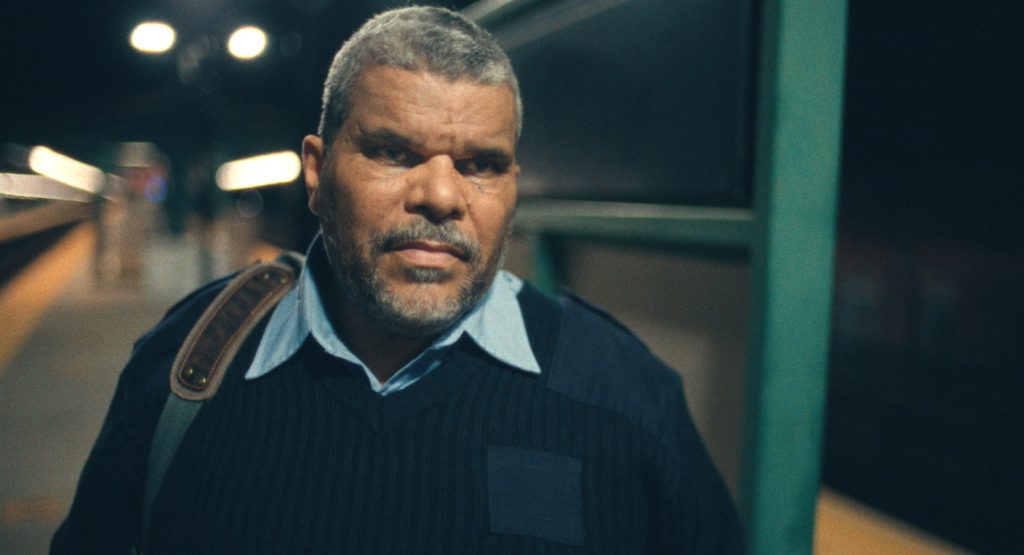
Let’s talk about getting your script in front of your future cast…
I couldn’t make the movie without Luis Guzman. He was my first point of attack. My reps at WME and Lighthouse could not get in touch with Guzman. His reps were like, ‘He’s not doing Indies right now. He’s not looking for this kind of role.’ No hyperbole; it was eighteen months of just waiting for a yes or no. Then, I was DJ’ing for this big promoter, Ruben Rivera, in New York City, who’s also an actor, and one day, I saw him and Guzman curtsied at the Knicks game. I DM him, and I’m like, ‘Dude, I’ve been trying to get in touch with this guy for eighteen months. I hate to ask, but I just need him to read this script.’ And forty-eight hours later, literally, I was on FaceTime with Guzman, and he was crying.
Oh my god.
He was like, ‘I have to do this movie.’ Sometimes rejection is rejection, and sometimes rejection is just a test to see how badly you really want it. If I just listened to my reps, it would be another actor in that role, and it would be a different movie, and it wouldn’t be the movie I set out to make. So, my stubbornness played in my favor. [Laughs]
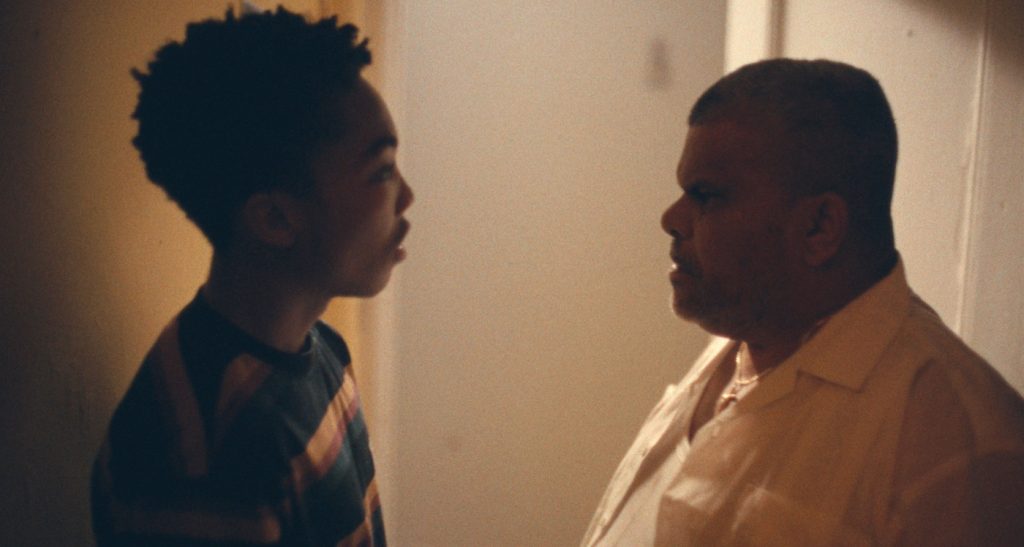
He is one of those guys that truly everyone loves.
Every time we’re in a screening together, as soon as he gets on the screen, everyone laughs. Everything he does, people laugh. And I’m always texting him like, ‘I hate you. You’ve ruined my movie.’ [Laughs]. There’s just a sense of familiarity you get with him, especially who this movie is made for. We grew up with Luis Guzmán; he’s almost like a distant uncle. There’s a certain level of comfort he brings not only to the protagonist, Kadir, but to the audience. What he brings to the film is invaluable.
Tell me about the production process.
The hardest thing I’ve ever done. By far. We’re an indie. We’re the little engine that could. We shot in twenty days, with two days of pickups months later. It’s just a grind, man. There are about six or seven scenes in the diner where Luis and Kadir build a rapport with each other. That was thirteen pages of dialogue, and we did all of it in one night. We averaged anywhere between seven to nine pages a day. I’m so grateful for my actors because we just didn’t have the time to explore and discover, so if they weren’t as phenomenal as they are, I don’t know how I ever could have done this film. The reality of the shooting schedule is you have twenty minutes to get the scene, and if you don’t get it, there’s no scene.
And you shot in New York, obviously.
We did, primarily in the Bronx, a little bit in Manhattan in Queens. I hope this movie can showcase the most beautiful and diverse textures that are in the Bronx. They were really welcoming of us, we made sure catering was done from local restaurants, and we tried to get as many background actors from the community as possible. They embraced us, and we embraced them, and it was a really cool experience. I’m honored I get to represent this community and these people. And the biggest validation I’ve gotten so far is from real people from my community who don’t get to see themselves depicted this way. Saying, ‘I’ve never felt so seen. I’ve never felt so safe to be vulnerable in a room full of people.’ It’s just like the highest honor you can receive.
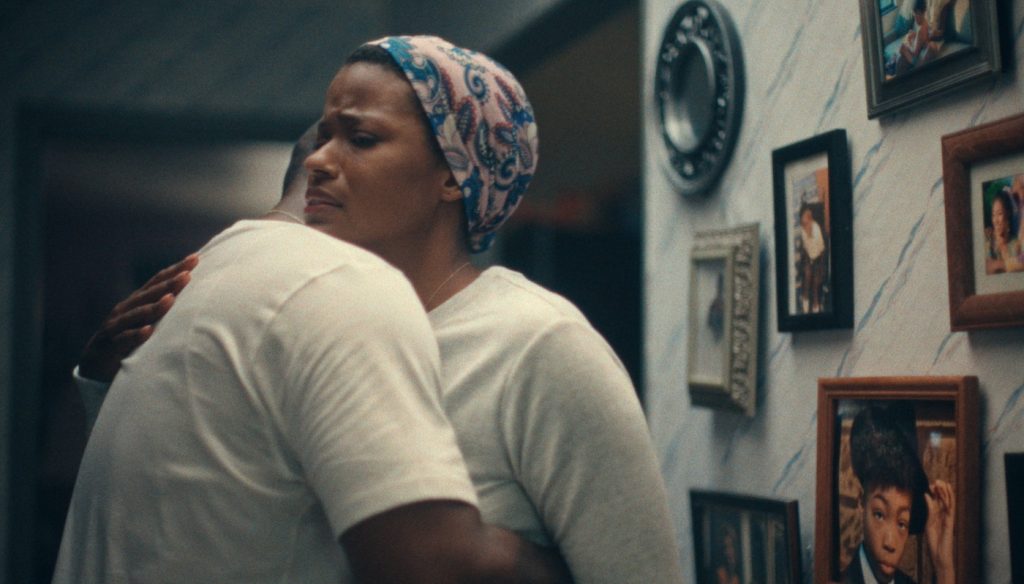
Any particular moments during production that stand out to you looking back?
I’d say filming the diner scene, getting thirteen and a half pages shot in one overnight. Even though we’re shooting the scenes back to back, you’re seeing them at different points in the story where the characters are at a different emotional place, so the blocking and grammar have to match that emotional point in the story. And there are only so many ways to shoot two people talking to each other. And doing that for fourteen hours straight is a really tall ask. And then the location—above the diner, there was a pool hall, and when we went to scout it, it was during the day, and it wasn’t opened. Then, when we went to shoot it, they were playing music at concert levels. Thank god that Luis Guzman, the national treasure he is, was able to go up there and talk to them. But you know, every hour, they’d put the music back on. Whether I realized it or not in the moment, all those elements are true to New York City. I think it added to the performance because all the frustrations are the frustrations you feel at that moment. Maybe I’ll do another movie and be on a soundstage, and I’ll have a PA blast some music to annoy us. [Laughs].
Featured image: Luis Guzmán and Asante Black in “Story Ave.” Courtesy Kino Lorber.



